九年级英语第六单元知识点
九年级英语unit6知识点梳理
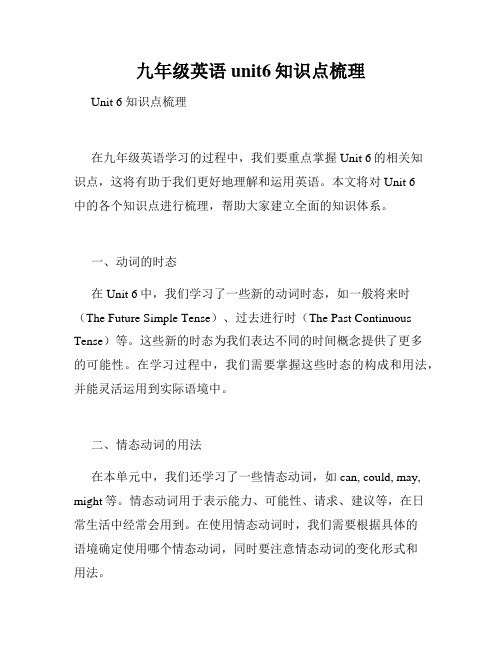
九年级英语unit6知识点梳理Unit 6 知识点梳理在九年级英语学习的过程中,我们要重点掌握Unit 6的相关知识点,这将有助于我们更好地理解和运用英语。
本文将对Unit 6中的各个知识点进行梳理,帮助大家建立全面的知识体系。
一、动词的时态在Unit 6中,我们学习了一些新的动词时态,如一般将来时(The Future Simple Tense)、过去进行时(The Past Continuous Tense)等。
这些新的时态为我们表达不同的时间概念提供了更多的可能性。
在学习过程中,我们需要掌握这些时态的构成和用法,并能灵活运用到实际语境中。
二、情态动词的用法在本单元中,我们还学习了一些情态动词,如can, could, may, might等。
情态动词用于表示能力、可能性、请求、建议等,在日常生活中经常会用到。
在使用情态动词时,我们需要根据具体的语境确定使用哪个情态动词,同时要注意情态动词的变化形式和用法。
三、非谓语动词除了时态和情态动词,本单元还介绍了非谓语动词的用法,包括不定式、动名词和现在分词等。
非谓语动词在句子中可以充当名词、形容词或者副词,使句子结构更加丰富。
我们需要掌握非谓语动词的构成和用法,并能在写作和阅读中准确地使用它们。
四、名词性从句名词性从句是英语中的一个重要知识点。
在本单元中,我们学习了名词性从句的三种类型:主语从句、宾语从句和表语从句。
名词性从句在句子中充当名词的角色,能够起到连接主从句的作用。
我们需要学会分辨和使用名词性从句,并能够根据具体的语境正确地运用它们。
五、冠词的用法冠词在英语中是一个重要的语法项目。
在Unit 6中,我们对定冠词(the)和不定冠词(a, an)进行了复习和扩展。
冠词的正确使用可以帮助我们准确表达自己的意思,同时也能够在阅读理解中帮助我们理解句子的含义。
因此,我们需要掌握不同场合下冠词的用法,并能够在实际运用中正确使用它们。
总之,Unit 6中的各个知识点对我们的英语学习都非常重要。
人教版英语九年级全册单元unit 6 知识点+测试卷+思维导图
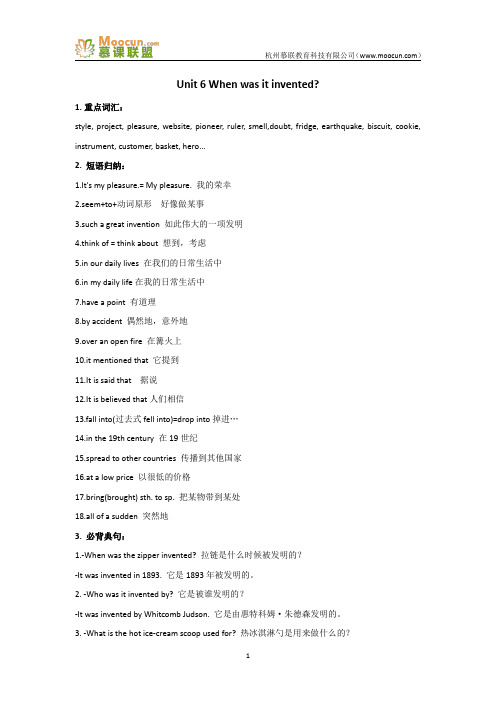
Unit 6 When was it invented?1.重点词汇:style, project, pleasure, website, pioneer, ruler, smell,doubt, fridge, earthquake, biscuit, cookie, instrument, customer, basket, hero...2. 短语归纳:1.It's my pleasure.= My pleasure. 我的荣幸2.seem+to+动词原形好像做某事3.such a great invention 如此伟大的一项发明4.think of = think about 想到,考虑5.in our daily lives 在我们的日常生活中6.in my daily life在我的日常生活中7.have a point 有道理8.by accident 偶然地,意外地9.over an open fire 在篝火上10.it mentioned that 它提到11.It is said that 据说12.It is believed that人们相信13.fall into(过去式fell into)=drop into掉进…14.in the 19th century 在19世纪15.spread to other countries 传播到其他国家16.at a low price 以很低的价格17.bring(brought) sth. to sp. 把某物带到某处18.all of a sudden 突然地3. 必背典句:1.-When was the zipper invented? 拉链是什么时候被发明的?-It was invented in 1893. 它是1893年被发明的。
2. -Who was it invented by? 它是被谁发明的?-It was invented by Whitcomb Judson. 它是由惠特科姆·朱德森发明的。
初中英语人教新目标九年级全一册unit6知识点
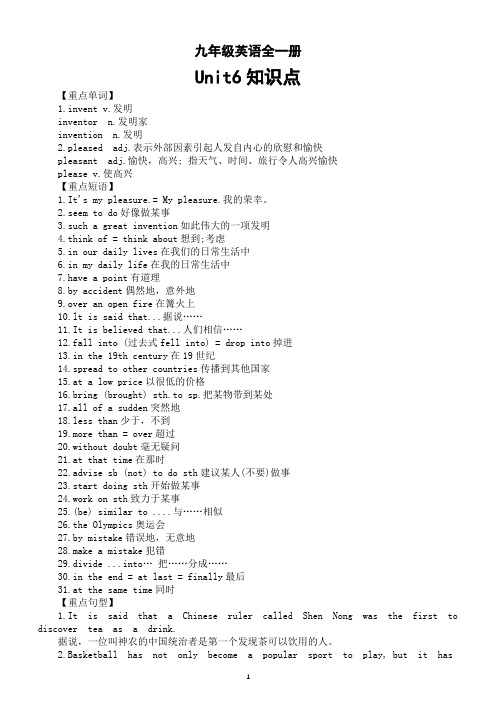
九年级英语全一册Unit6知识点【重点单词】1.invent v.发明inventor n.发明家invention n.发明2.pleased adj.表示外部因素引起人发自内心的欣慰和愉快pleasant adj.愉快,高兴; 指天气、时间、旅行令人高兴愉快please v.使高兴【重点短语】1.It's my pleasure.= My pleasure.我的荣幸。
2.seem to do好像做某事3.such a great invention如此伟大的一项发明4.think of = think about想到;考虑5.in our daily lives在我们的日常生活中6.in my daily life在我的日常生活中7.have a point有道理8.by accident偶然地,意外地9.over an open fire在篝火上10.lt is said that...据说……11.It is believed that...人们相信……12.fall into (过去式fell into) = drop into掉进13.in the 19th century在19世纪14.spread to other countries传播到其他国家15.at a low price以很低的价格16.bring (brought) sth.to sp.把某物带到某处17.all of a sudden突然地18.less than少于,不到19.more than = over超过20.without doubt毫无疑问21.at that time在那时22.advise sb (not) to do sth建议某人(不要)做事23.start doing sth开始做某事24.work on sth致力于某事25.(be) similar to ....与……相似26.the Olympics奥运会27.by mistake错误地,无意地28.make a mistake犯错29.divide ...into…把……分成……30.in the end = at last = finally最后31.at the same time同时【重点句型】1.It is said that a Chinese ruler called Shen Nong was the first to discover tea as a drink.据说,一位叫神农的中国统治者是第一个发现茶可以饮用的人。
九上英语第六单元笔记
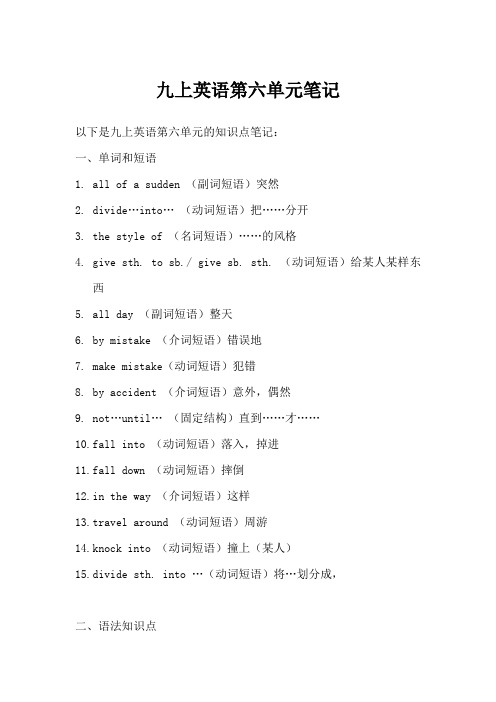
九上英语第六单元笔记以下是九上英语第六单元的知识点笔记:一、单词和短语1.all of a sudden (副词短语)突然2.divide…into…(动词短语)把……分开3.the style of (名词短语)……的风格4.give sth. to sb./ give sb. sth. (动词短语)给某人某样东西5.all day (副词短语)整天6.by mistake (介词短语)错误地7.make mistake(动词短语)犯错8.by accident (介词短语)意外,偶然9.not…until…(固定结构)直到……才……10.f all into (动词短语)落入,掉进11.f all down (动词短语)摔倒12.i n the way (介词短语)这样13.t ravel around (动词短语)周游14.k nock into (动词短语)撞上(某人)15.d ivide sth. into …(动词短语)将…划分成,二、语法知识点1.句子结构:掌握简单句、并列句和复合句的构成和用法。
2.时态:掌握一般现在时、现在进行时、一般过去时和过去进行时的用法和变化规则。
3.语态:掌握主动语态和被动语态的构成和用法。
4.情态动词:掌握can、could、may、might、must等情态动词的用法和含义。
5.非谓语动词:掌握不定式、动名词和分词的构成和用法。
6.名词性从句:掌握主语从句、表语从句、宾语从句和同位语从句的构成和用法。
7.定语从句:掌握定语从句的构成和用法,包括先行词、关系代词和关系副词等。
8.状语从句:掌握时间状语从句、条件状语从句、原因状语从句、目的状语从句等状语从句的构成和用法。
三、阅读理解1.掌握阅读理解文章的构成和特点,包括文章结构、主题、细节信息等。
2.学习如何通过阅读理解文章获取信息,包括细节信息和主旨大意。
3.学习如何推断作者的意图和态度,以及如何分析文章中的观点和论据。
人教九年级英语Unit6全单元知识点讲解
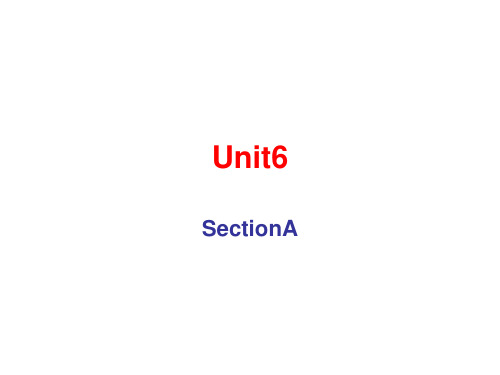
eg:---Do you know who invented the light bulb(电灯泡)?
---Edison.
拓展:
inventor n.发明家
invent v.发明
invention n.发明
Edison,a great ________,________ many
Boil the potato for 20 minutes. 把土豆煮20分钟。 Water boils at 100℃. 水在100℃沸腾。
• remain v.保持不变;剩余 ① 作连系动词,“仍然是(处于某种状态);
保持不变”=keep。其后可接形容词、名词、 分词或介词短语作表语。
eg;The room remains cool all summer. 这个房间整个夏天保持凉爽。
• by accident 偶然;意外地=by chance eg:我在街上偶然遇到了Tom。
I met Tom by accident in the street.(作 状语)
Tea was invented _b__y_a_c_c_id__en__t _.
• nearly(almost) adv.几乎;差不多 eg:我几乎从自行车上摔下来。
great _________ during his life.
• heel n.鞋跟;足跟 • scoop n.勺;铲子 • electricity n.电;电能
• style n.样式;款式;风格;方式
eg:The style of the shirt is just in season.
I wouldn't tell lies to you.That's not my style. in style流行的;时髦的 out of style过时的 a life style生活方式
人教版九年级英语第六单元重点短语及句型知识点小结
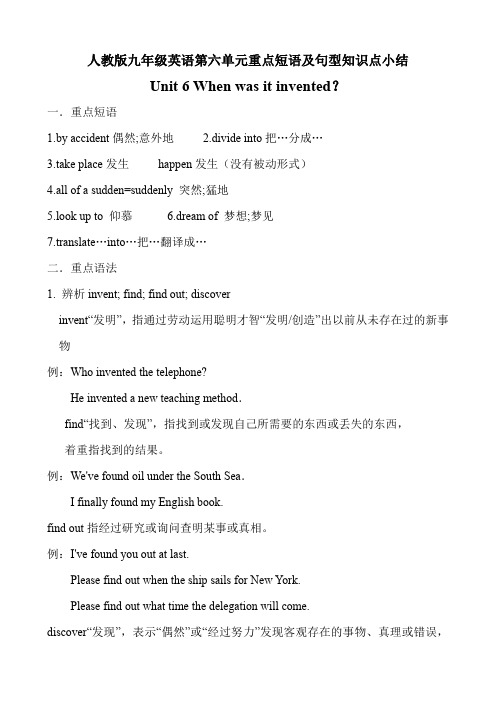
人教版九年级英语第六单元重点短语及句型知识点小结Unit 6 When was it invented?一.重点短语1.by accident偶然;意外地2.divide into把…分成…3.take place发生happen发生(没有被动形式)4.all of a sudden=suddenly 突然;猛地5.look up to 仰慕6.dream of 梦想;梦见7.translate…into…把…翻译成…二.重点语法1. 辨析invent; find; find out; discoverinvent“发明”,指通过劳动运用聪明才智“发明/创造”出以前从未存在过的新事物例:Who invented the telephone?He invented a new teaching method.find“找到、发现”,指找到或发现自己所需要的东西或丢失的东西,着重指找到的结果。
例:We've found oil under the South Sea.I finally found my English book.find out指经过研究或询问查明某事或真相。
例:I've found you out at last.Please find out when the ship sails for New York.Please find out what time the delegation will come.discover“发现”,表示“偶然”或“经过努力”发现客观存在的事物、真理或错误,即指发现原来客观存在但不为人所知的事物,也可表示发现已为人所知的事物的新的性质或用途。
Columbus discovered America in1492.We soon discovered the truth.我们很快就弄清了真相。
【练习】a.Edison ____the electric lamp.b.I lost my necklace last night.I haven’t ____it.c.Who ____America first?d.Can you ____what time the train leaves?2.一般过去时的被动语态(见P188页)结构:was/were+过去分词【练习】( ) 1. People's Republic of China __ on October 1, 1949.A. foundB. was foundedC. is foundedD. was found( ) 2. English ____ in Canada.A. speaksB. are spokenC. is speakingD. is spoken( ) 3 This English song __ by the girls after class.A. often singsB. often sangC.is often sangD.is often sung( ) 4 This kind of car___ in Japan.A. makesB. madeC. is makingD. is made( ) 5 Computers ___ all over the world.A. is usedB. are usingC. are usedD. have used。
九年级英语全册 Unit 6 When was it invented?知识点总结 (新版)人教新目标版
Unit 6 When was it invented? 【重点单词】1. project n. 项目,工程;2. pleasure n. 高兴,愉快;3. daily adj. 日常的,每日的;4. mention v. 提到,说到;5. nearly adv.几乎,差不多;6. boil v. 煮沸,烧开;7. remain v. 保持不变;剩余;8. national adj.国家的,民族的;9. low adj.低的,矮的;10. translate v.翻译;11. lock v.锁上;n. 锁;12. sudden adj. 突然的13. crispy adj. 脆的;酥脆的;14. salty adj.咸的;15. sour adj.酸的,有酸味的;16. customer n.顾客。
17. Canadian 加拿大的,18. divide v.分开,分散;19. hero n英雄,男主角;20. professional adj. 职业的,专业的;【重点词组】1. shoes with special heels 特殊后跟的鞋子2. hot ice cream scoop 热的冰其淋勺子3. run on electricity 电动的4. be used for 被用作5. the subject for my school project 学校项目的课题6. our daily lives 我们的日常生活7. have a point 有点道理8. by accident 偶然,意外地9. over the open fire 在火堆上10. fall into the water 落入水中11. take place 发生12. without doubt 毫无疑问13. at a low price 以一个很低的价格14. translate the book into different language 把书翻译成不同种的语言15. all of sudden 突然16. by mistake 错误地17. a much-loved and active sport 一个深受喜爱并且积极的运动18. divide…into 把…分开19. stop sb from doing sth 阻止某人做某事20. look up to 钦佩,仰慕21. the professional basketball groups 职业篮球机构22. use someone else’s idea 借用其他人的想法【重点句式】1. I think the TV was invented before the car. 我认为电视是在轿车之前发明的。
英语九年级全一册6单元知识点
英语九年级全一册6单元知识点一、词汇1. 人名:Ann(安)、Tom(汤姆)2. 地点:学校、图书馆、教室3. 学科:科学、历史、数学4. 动作:学习、研究、讨论5. 其他词汇:课程表、书桌、书架、书、笔记本、笔二、语法1. 现在完成时的用法:强调过去发生的事情对现在产生的影响或结果。
2. havehas been to和havehas been的用法及区别。
三、句型1. It has been three years since they have been studying science together.(他们一起学习科学已经三年了。
)2. I have seen that film many times, but it is still interesting.(我看了那部电影很多次,但是它仍然很有趣。
)3. I have a class at 3 pm every Friday, and I have to finish my homework before that.(我每周五下午三点有一节课,我必须在课前完成作业。
)四、阅读理解练习题将涵盖本单元的课文内容,以及相关的扩展知识,旨在帮助读者更好地理解和掌握本单元的重点和难点。
五、写作练习题将包括一些与本单元主题相关的写作任务,旨在提高读者的写作技巧和表达能力。
六、文化知识本单元还将涉及一些与科学和历史相关的文化知识,包括一些科学原理和历史事件,以及它们在现实生活中的应用。
读者可以通过了解这些知识,更好地理解西方文化和社会。
总的来说,本单元的学习内容丰富,涵盖了词汇、语法、句型、阅读理解、写作和文化知识等多个方面。
通过系统地学习和练习,读者可以更好地掌握本单元的知识点,提高自己的英语水平。
九年级英语人教版第六单元知识点汇总
Increase多指数量的增加;上升
The populationof the cityhas increased from 2 million 10 years ago to4million now..
13.at a low \ high price以低\高价
14. translate… into…把…译成…
15. all of sudden = suddenly忽然;突然
16.by mistake错误地
17. in the end = finally =at last最后;终于
18. potato chips薯条
九年级英语人教版第六单元知识点汇总
一、句型
一般过去时的被动语态
一般过去时态的被动语态的结构:was\ were+ done
将下列句子改为被动语态。
1. He translated thenovelinto three different languages.
2. Did someone telephone Sam?
3. in our daily lives在我们日常生活中
4. have a point有道理
5. Don’t mention it. 1)“不客气”用来回答感谢2)“没关系”用来回答道歉3) “不提了”表示不重要,或不想提
6. by accident偶然地;意外地
7. it is said that…据说…
24. look up to钦佩;仰慕
25.achieve(=realize)one’s dream实现某人的梦想比较:one’sdream comes true
26. decide on选定(对…做出决定)
英语九年级六单元知识点
英语九年级六单元知识点一、动词时态1. 一般现在时:表示经常性、习惯性的动作或状态。
例句:I often go swimming on weekends.2. 一般过去时:表示过去某个时间发生的事情。
例句:He watched a movie last night.3. 一般将来时:表示将来某个时间会发生的事情。
例句:They will visit their grandparents next week.4. 现在进行时:表示现在正在进行的动作。
例句:She is reading a book at the moment.5. 过去进行时:表示过去某个时间正在进行的动作。
例句:We were playing soccer when it started to rain.6. 现在完成时:表示已经完成的动作对现在造成的影响。
例句:He has already finished his homework.7. 过去完成时:表示在过去某个时间之前已经完成的动作。
例句:By the time she arrived, they had already left.二、被动语态被动语态的构成:助动词be + 过去分词。
1. 一般现在时的被动语态:am/is/are + 过去分词。
例句:The book is read by me.2. 一般过去时的被动语态:was/were + 过去分词。
例句:The movie was watched by them last night.3. 一般将来时的被动语态:will be + 过去分词。
例句:The report will be delivered by him tomorrow.4. 现在进行时的被动语态:am/is/are being + 过去分词。
例句:The house is being cleaned by the maids.5. 现在完成时的被动语态:have/has been + 过去分词。
- 1、下载文档前请自行甄别文档内容的完整性,平台不提供额外的编辑、内容补充、找答案等附加服务。
- 2、"仅部分预览"的文档,不可在线预览部分如存在完整性等问题,可反馈申请退款(可完整预览的文档不适用该条件!)。
- 3、如文档侵犯您的权益,请联系客服反馈,我们会尽快为您处理(人工客服工作时间:9:00-18:30)。
九年级英语第六单元知识点
1. please v. 使高兴→ adj. pleased高兴的,愉快的。
用来形容人的形容词。
→adj. pleasant 令人愉快的,令人高兴的。
用来形容事物的。
→n. pleasure 高兴,愉快
2. invent v. 发明→n. invention 发明 inventor 发明者
V. + or = n. 这样的动词有: act , collect , visit , operate , translate
1. with prep. 带有,具有与后面的名词一起构成介宾短语常作定语。
shoes with lights 带着灯的鞋shoes with special heels 有特殊鞋跟的鞋
—Kelly , who’s the girl glasses in the photo ?
—It’s me . I used to wear glasses and have long hair .
A by
B of
C on
D with
2. such adj. 如此的,这样的,用来修饰名词。
常用结构为:
⑴such + a / an + adj. + 单数可数名词=so + adj. + a / an + 单数可数名词
This is such a nice horse . 这是一匹如此好的马。
=
⑵such + adj. + 复数可数名词There are such good books in the library .
⑶such + adj. + 不可数名词She has made such great progress in the exam .
3. pleased adj. 高兴的,满意的be pleased with 对……高兴/ 满意
I am pleased with your answer . 我对你的回答很满意。
pleasant adj. 令人愉快的,用来形容物的。
It’s a pleasant vacation . 这是一次令人愉快的假期。
pleasure n. 高兴,乐趣,愉快
With pleasure 非常愿意,用来慷慨应允别人的请求的。
My pleasure . 不客气,很乐意效劳,对别人表示感谢的一种礼貌回答
①—Thank you for your help . — My pleasure .
②—Will you come with me ? — With pleasure
1. It is said that …据说……其中it为形式主语,真正的主语是that引导的从句。
类似的句型还有It is believed that …据人们认为
It is said that he got good scores in the math exam .
2. the first / second / last to do sth . 第一个 / 第二个 / 最后一个做某事的人。
Mr Brown is the last to leave school . 布朗先生是最后一个离开学校的
3. happen v. 发生指客观事件的发生,具有偶然性、未能预见的含义。
When did the accident happen ? 事故什么时候发生的?
happen to do sth 碰巧做某事
take place 发生指某些历史事件或会议的发生以及化学、物理变化的发生,
含有事先预料或计划的意思,没有偶然的含义。
In 1919, the May 4th Movement took place in China . 4. invent v. 发明,创造,主要指发明一种世上原本不存在的东西,如点
灯、收音机、汽车等。
discover v. 发现,指发现一种世上本来就存在的,只是人们现在才认
识到的东西,如溶洞、古迹、化石等。
When was the computer invented ? 电脑是什么时候发明的?
Columbus discovered America in 1492 .哥伦布在1492年发现了美洲。
5. advise v. 建议 advise sb. to do sth . 建议某人做某事
I advise you not to miss the early bus . 我建议你不要错过早班车。
→ n. advice不可数名词建议
give sb. some advice on 给某人提有关……的建议
My teacher often gives us some useful advice on English study .
1.mistake n. 错误 make a mistake 犯错误 by mistake 错误地,无意中
v. 弄错mistake …for …错把……当成……
He put salt into your tea by mistake 他错把盐放进你的茶里。
2.stop v. 阻止,停止 stop to do sth. (不定式作目的状语) 停下来去做某事
stop doing sth .(动名词作宾语)停止做某事
stop …(from )doing…=keep…from…=prevent…from… 阻止……做某事
The heavy rain stopped us from arriving there on time .
大雨阻止了我们按时到达那里
3.encourage v. 鼓励 encourage sb. to do sth . 鼓励某人做某事
The teacher encouraged the students to study .
4.achieve v. 实现,获得主语为人→n. achievement 成就
come true 实现主语通常是“愿望、理想、梦想”等表示物的名词。
Our dream will come true . 我们的梦想会实现的。
We have achieved our aim. 我们实现了我们的目标。
5.not only …but also …不但……而且……连接主语时动词就近原则,即:
neither…nor… 既不……也不……动词与靠近它的主语
either… or…或者……或者……
both…and………和……都…… 连接主语时动词用复数。
6. It is believed that … 人们相信…… /人们认为……
It is said that …据说……
It is reported that…据报道……
It is supposed that …据猜测……
It is known that …众所周知……
7. include v. 包括→prep. including 包括,使用时前面用逗号隔开。
include 动词v. 包括(一般用作充当居中谓语动词)
including 介词prep. 包括(常用于逗号后,介词短语做后置定语)including Tom
in cluded 形容词adj. 包括(用在名词后面,表示名词被包括在内)Tom dincluded
8.the number of + 可数名词复数“……的数量”,做主语时动词用单数。
a number of + 可数名词复数“许多,大量”,做主语时动词为复数。
9. The potato chips were invented by mistake. (P45)土豆条的发明纯属歪打正着。
(1) potato chips是一个复合名词,其中第一个名词用作定语修饰后一个名
词,这样的例子有很多,又如: alarm clock, telephone number等。
知识拓展
复合名词变复数的规则,你一定要牢记啊!
◎通常只把主体名词变为复数
school boy—school boys(男生) apple tree—apple trees(苹果树)
vegetable sandwich—vegetable sandwiches(蔬菜三明治)
girl friend—girl friends(女朋友)
◎如果没有主体名词,在最后一个名词上用复数。
good-for-nothing—good-for-nothings(饭桶、无用的人)
three-year-old—three-year-olds(三岁的孩子)
◎由man, woman和另外一个名词构成的复合名词,两个部分都要用复数。
man teacher—men teachers(男教师) gentleman farmer—gentlemen farmers (乡绅)1.lead v. 领导,引导→ pt. / pp. led
→ n. leader 领导者,引导者
lead sb. to do sth . 领导某人做某事
The girl often leads the old to cross the street . 这个女孩经常领老人过马路。
2. use sth. to do sth .用某物做某事
We use pens to write .我们用钢笔写字。
